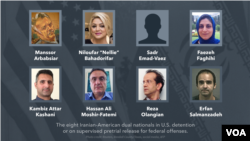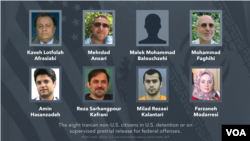Iran is not serious about wanting a prisoner exchange with the United States and instead appears to be seeking money as part of any deal to release four Americans labeled by the U.S. as hostages of Tehran, according to informed sources.
U.S. and Iranian officials have been trying to negotiate a potential rare exchange of prisoners since last April, when they began indirect talks through mediators in Vienna to try to revive a 2015 nuclear deal between Iran, the U.S. and other world powers.
In recent years, Iranian officials have repeatedly said they want a full exchange of prisoners in which the U.S. would release all Iranian citizens whom they describe as unjustly detained for reasons such as violations of U.S. sanctions against Tehran.
Iranian Foreign Ministry spokesperson Saeed Khatibzadeh, speaking at a January 24 news conference, said Iran could reach "lasting" agreements on the prisoner and nuclear issues in a short time "if there is a will on the [U.S.] side."
Neither Iran nor the U.S. has published lists of Iranians under U.S. detention and prosecution.
16 names
A VOA Persian review of U.S. Justice Department databases found 16 Iranians in U.S. detention or on supervised pretrial release for proven or alleged federal crimes, mostly related to long-running U.S.-Iran tensions. The number of Iranians detained in the U.S. for non-federal offenses is unknown.
In Iran, four Iranian American dual nationals are in detention or barred from leaving the country for alleged security offenses that the U.S. says were trumped up so that Tehran could use the Americans as bargaining chips. The Biden administration, like its predecessors, has pledged to work to bring them home.
The four are businessman Siamak Namazi, who was arrested in October 2015; his father and former U.N. official Baquer Namazi, who was detained in February 2016 and granted a medical furlough from prison in 2018 but barred from leaving Iran; Morad Tahbaz, an environmentalist who was arrested in January 2018; and businessman Emad Shargi, who has been detained since December 2020.
The 16 Iranians in U.S. detention or on supervised pretrial release for federal offenses consist of eight Iranian American dual nationals, four Iranian citizens with U.S. permanent residency, and four Iranian citizens with no legal status in the U.S.
Of the eight Iranian Americans, three are serving prison sentences for violating U.S. or international sanctions against Iran: Sadr Emad-Vaez, Hassan Ali Moshir-Fatemi and Reza Olangian. A fourth, Manssor Arbabsiar, is serving a prison sentence for conspiring with Iranian officials in a foiled plot to assassinate Saudi Arabia's ambassador to the U.S. in 2011.
Three of the other Iranian Americans are charged with U.S. sanctions violations: Faezeh Faghihi and Niloufar "Nellie" Bahadorifar, who are on supervised pretrial release, and Kambiz Attar Kashani, who is in custody pending a detention hearing after his arrest in Chicago last month. The eighth, Erfan Salmanzadeh, is in custody and undergoing a psychiatric evaluation after being charged with possessing a destructive device that exploded at his home in Texas last year.
Of the four Iranian U.S. permanent residents, three are charged with U.S. sanctions violations: Amin Hasanzadeh and Farzeneh Modarresi, who are on supervised pretrial release, and Mohammad Faghihi, who is in pretrial detention. The fourth, political commentator Kaveh Lotfolah Afrasiabi, is on supervised pretrial release and charged with acting as an unregistered Iranian agent.
Of the four Iranians with no legal status in the U.S., Mehrdad Ansari is serving a prison sentence and Reza Sarhangpour Kafrani is on supervised pretrial release, both in U.S. sanctions violation cases; Milad Rezaei Kalantari is serving a prison sentence for conspiracy to sell stolen credit card information online, and Malek Mohammad Balouchzehi is in pretrial detention on charges of conspiring to sell heroin for distribution in the U.S.
Less interest than before
A source with knowledge of the issue told VOA that Iranian officials appear less interested or engaged in securing the release of Iranians currently jailed or prosecuted in the U.S. than they did when discussing previous cases. The source requested anonymity to avoid disrupting diplomacy related to the U.S.-Iran prisoner dispute.
Iran previously obtained the release of two of its citizens from U.S. detention as part of prisoner exchange agreements with the administration of Donald Trump, who preceded President Joe Biden.
In June 2020, Trump granted an early release to Iranian American medical doctor Matteo Taerri, also known as Majid Taheri, who served 16 months in prison for violating U.S. sanctions against Iran and U.S. banking laws. In exchange, Iran allowed U.S. Navy veteran Michael White to return home after detaining him for 20 months on security charges deemed bogus by the U.S.
In December 2019, Trump released Iranian scientist Masoud Soleimani, who had been detained and charged in another U.S. sanctions violation case. In return, Iran freed Chinese American historian Xiyue Wang from three years of imprisonment for what the U.S. said were false security charges. That prisoner swap happened in Zurich via Swiss mediation.
A second source — former U.S. diplomat Barry Rosen, who was held hostage in Iran after the 1979 Islamic Revolution — told VOA that when he met with U.S. Special Envoy for Iran Robert Malley and European officials in Vienna last month, he heard that Iran was looking for money in return for freeing the four Americans in its custody, rather than for the U.S. to release detained Iranians.
"The Iranian government doesn't care about doing an exchange for their people," Rosen said. "They think their people [detained in the U.S.] are failures and useless. Look, they want money. They are in dire straits economically and need it."
Rosen, 77, met with the officials in Vienna while on a five-day hunger strike to press for a U.S.-Iran deal to free the four Americans and other Westerners of Iranian origin detained in Iran. He is a senior adviser to U.S. advocacy group United Against Nuclear Iran (UANI).
'Good talking point'
UANI policy director Jason Brodsky said in a separate VOA interview that Iran's pledge to seek the release of what it describes as its oppressed citizens in the U.S. is a "good talking point" for Tehran.
"But they won't admit that their priority is the unfreezing of Iranian assets for regime preservation, because that doesn't sell so well, publicly," he said.
Brodsky said Iran also appears to believe it can ask the U.S. to pay a higher price than before for the release of the four detained Iranian Americans because Tehran does not recognize their dual nationality and sees them solely as Iranian criminals whose freedom Washington seeks. The two Americans released by Iran in 2019 and 2020 were not Iranian nationals.
"If the U.S. unfreezes Iranian assets in exchange for the release of the four American hostages, that would incentivize Iran to take more Americans and other Western nationals hostage in the future," Brodsky said.
It is unclear what the U.S. would consider giving Iran in a deal to free the four Americans. When a VOA Persian reporter raised the issue with a senior State Department official in a Monday phone briefing, the official declined to go into details, citing the sensitivity of negotiations.
"For us, this is an absolute priority to get the four back home, and we will not do anything that could complicate either the return or the treatment that they are undergoing while in Iran," the U.S. official said.
A 2019 FBI report said it is a "long-standing" U.S. policy not to pay ransoms to hostage takers.
Guita Aryan of VOA's Persian Service contributed to this report.





